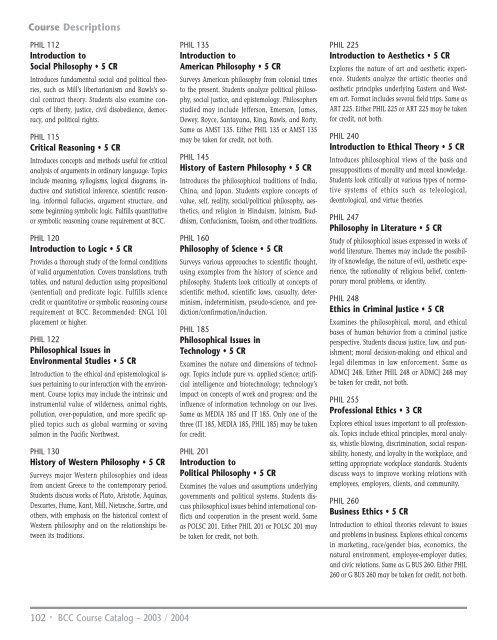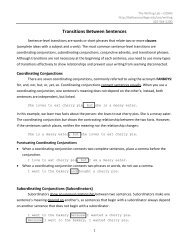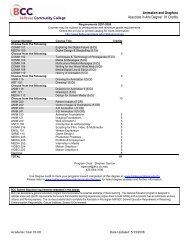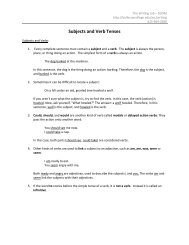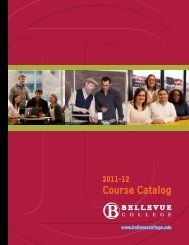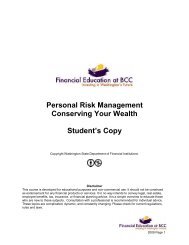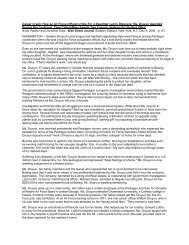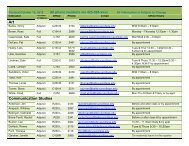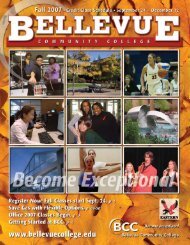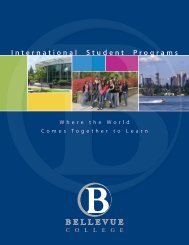2003 / 2004 - Bellevue College
2003 / 2004 - Bellevue College
2003 / 2004 - Bellevue College
Create successful ePaper yourself
Turn your PDF publications into a flip-book with our unique Google optimized e-Paper software.
Course Descriptions<br />
PHIL 112<br />
Introduction to<br />
Social Philosophy • 5 CR<br />
Introduces fundamental social and political theories,<br />
such as Mill’s libertarianism and Rawls’s social<br />
contract theory. Students also examine concepts<br />
of liberty, justice, civil disobedience, democracy,<br />
and political rights.<br />
PHIL 115<br />
Critical Reasoning • 5 CR<br />
Introduces concepts and methods useful for critical<br />
analysis of arguments in ordinary language. Topics<br />
include meaning, syllogisms, logical diagrams, inductive<br />
and statistical inference, scientific reasoning,<br />
informal fallacies, argument structure, and<br />
some beginning symbolic logic. Fulfills quantitative<br />
or symbolic reasoning course requirement at BCC.<br />
PHIL 120<br />
Introduction to Logic • 5 CR<br />
Provides a thorough study of the formal conditions<br />
of valid argumentation. Covers translations, truth<br />
tables, and natural deduction using propositional<br />
(sentential) and predicate logic. Fulfills science<br />
credit or quantitative or symbolic reasoning course<br />
requirement at BCC. Recommended: ENGL 101<br />
placement or higher.<br />
PHIL 122<br />
Philosophical Issues in<br />
Environmental Studies • 5 CR<br />
Introduction to the ethical and epistemological issues<br />
pertaining to our interaction with the environment.<br />
Course topics may include the intrinsic and<br />
instrumental value of wilderness, animal rights,<br />
pollution, over-population, and more specific applied<br />
topics such as global warming or saving<br />
salmon in the Pacific Northwest.<br />
PHIL 130<br />
History of Western Philosophy • 5 CR<br />
Surveys major Western philosophies and ideas<br />
from ancient Greece to the contemporary period.<br />
Students discuss works of Plato, Aristotle, Aquinas,<br />
Descartes, Hume, Kant, Mill, Nietzsche, Sartre, and<br />
others, with emphasis on the historical context of<br />
Western philosophy and on the relationships between<br />
its traditions.<br />
102 • BCC Course Catalog ~ <strong>2003</strong> / <strong>2004</strong><br />
PHIL 135<br />
Introduction to<br />
American Philosophy • 5 CR<br />
Surveys American philosophy from colonial times<br />
to the present. Students analyze political philosophy,<br />
social justice, and epistemology. Philosophers<br />
studied may include Jefferson, Emerson, James,<br />
Dewey, Royce, Santayana, King, Rawls, and Rorty.<br />
Same as AMST 135. Either PHIL 135 or AMST 135<br />
may be taken for credit, not both.<br />
PHIL 145<br />
History of Eastern Philosophy • 5 CR<br />
Introduces the philosophical traditions of India,<br />
China, and Japan. Students explore concepts of<br />
value, self, reality, social/political philosophy, aesthetics,<br />
and religion in Hinduism, Jainism, Buddhism,<br />
Confucianism, Taoism, and other traditions.<br />
PHIL 160<br />
Philosophy of Science • 5 CR<br />
Surveys various approaches to scientific thought,<br />
using examples from the history of science and<br />
philosophy. Students look critically at concepts of<br />
scientific method, scientific laws, casualty, determinism,<br />
indeterminism, pseudo-science, and prediction/confirmation/induction.<br />
PHIL 185<br />
Philosophical Issues in<br />
Technology • 5 CR<br />
Examines the nature and dimensions of technology.<br />
Topics include pure vs. applied science; artificial<br />
intelligence and biotechnology; technology’s<br />
impact on concepts of work and progress; and the<br />
influence of information technology on our lives.<br />
Same as MEDIA 185 and IT 185. Only one of the<br />
three (IT 185, MEDIA 185, PHIL 185) may be taken<br />
for credit.<br />
PHIL 201<br />
Introduction to<br />
Political Philosophy • 5 CR<br />
Examines the values and assumptions underlying<br />
governments and political systems. Students discuss<br />
philosophical issues behind international conflicts<br />
and cooperation in the present world. Same<br />
as POLSC 201. Either PHIL 201 or POLSC 201 may<br />
be taken for credit, not both.<br />
PHIL 225<br />
Introduction to Aesthetics • 5 CR<br />
Explores the nature of art and aesthetic experience.<br />
Students analyze the artistic theories and<br />
aesthetic principles underlying Eastern and Western<br />
art. Format includes several field trips. Same as<br />
ART 225. Either PHIL 225 or ART 225 may be taken<br />
for credit, not both.<br />
PHIL 240<br />
Introduction to Ethical Theory • 5 CR<br />
Introduces philosophical views of the basis and<br />
presuppositions of morality and moral knowledge.<br />
Students look critically at various types of normative<br />
systems of ethics such as teleological,<br />
deontological, and virtue theories.<br />
PHIL 247<br />
Philosophy in Literature • 5 CR<br />
Study of philosophical issues expressed in works of<br />
world literature. Themes may include the possibility<br />
of knowledge, the nature of evil, aesthetic experience,<br />
the rationality of religious belief, contemporary<br />
moral problems, or identity.<br />
PHIL 248<br />
Ethics in Criminal Justice • 5 CR<br />
Examines the philosophical, moral, and ethical<br />
bases of human behavior from a criminal justice<br />
perspective. Students discuss justice, law, and punishment;<br />
moral decision-making; and ethical and<br />
legal dilemmas in law enforcement. Same as<br />
ADMCJ 248. Either PHIL 248 or ADMCJ 248 may<br />
be taken for credit, not both.<br />
PHIL 255<br />
Professional Ethics • 3 CR<br />
Explores ethical issues important to all professionals.<br />
Topics include ethical principles, moral analysis,<br />
whistle blowing, discrimination, social responsibility,<br />
honesty, and loyalty in the workplace, and<br />
setting appropriate workplace standards. Students<br />
discuss ways to improve working relations with<br />
employees, employers, clients, and community.<br />
PHIL 260<br />
Business Ethics • 5 CR<br />
Introduction to ethical theories relevant to issues<br />
and problems in business. Explores ethical concerns<br />
in marketing, race/gender bias, economics, the<br />
natural environment, employee-employer duties,<br />
and civic relations. Same as G BUS 260. Either PHIL<br />
260 or G BUS 260 may be taken for credit, not both.


